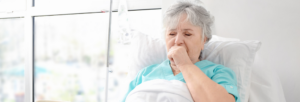RSV in Older Adults and Adults with Chronic Medical Conditions
October 23, 2023
RSV infections can be dangerous for certain adults. Each year, it is estimated that between 60,000-160,000 older adults in the United States are hospitalized and 6,000-10,000 die due to RSV infection. Adults at highest risk for severe RSV infection include:
- Older adults
- Adults with chronic heart or lung disease
- Adults with weakened immune systems
- Adults with certain other underlying medical conditions
- Adults living in nursing homes or long-term care facilities
An RSV vaccine protects against serious disease
RSV vaccines can help protect adults aged 60 years and older from RSV. Talk to your healthcare provider to see if vaccination is right for you.
You can get an RSV vaccine at the same time you get other recommended vaccines, such as flu or COVID-19 vaccines. For information about where to find vaccines in your area, visit Vaccine Information for Adults | Where to Find Adult Vaccines | CDC.
When an adult gets RSV infection, they typically have mild cold-like symptoms, but some may develop a lung infection or pneumonia.
RSV can sometimes also lead to worsening of serious conditions such as:
- Asthma
- Chronic obstructive pulmonary disease (COPD) – a chronic disease of the lungs that makes it hard to breathe
- Congestive heart failure – when the heart can’t pump enough blood and oxygen through the body
Older adults who get very sick from RSV may need to be hospitalized. Some may even die. Older adults are at greater risk than young adults for serious complications from RSV because our immune systems weaken when we are older.
What you should do if you or a loved one is at high risk for severe RSV disease
RSV season in most regions of the U.S. starts in the fall and peaks in winter. If you are at high risk for severe RSV infection, or if you interact with an older adult, you should take extra care to keep them healthy:
- Wash your hands often
Wash your hands often with soap and water for at least 20 seconds. If soap and water are not available, use an alcohol-based hand sanitizer. Washing your hands will help protect you from germs. - Avoid touching your face with unwashed hands
Avoid touching your eyes, nose, and mouth with unwashed hands. Germs spread this way. - Avoid close contact with sick people
Avoid close contact, such as kissing, and sharing cups or eating utensils with people who have cold-like symptoms. - Cover your coughs and sneezes
Cover your mouth and nose with a tissue or your upper shirt sleeve when coughing or sneezing. Throw the tissue in the trash afterward. - Clean frequently touched surfaces
Clean surfaces and objects that people frequently touch, such as toys, doorknobs, and mobile devices. When people infected with RSV touch surfaces and objects, they can leave behind germs. Also, when they cough or sneeze, droplets containing germs can land on surfaces and objects. - Stay home when you are sick
If possible, stay home from work, school, and public areas when you are sick. This will help protect others from catching your illness.
To learn more, please visit https://www.cdc.gov/rsv/high-risk/older-adults.html.